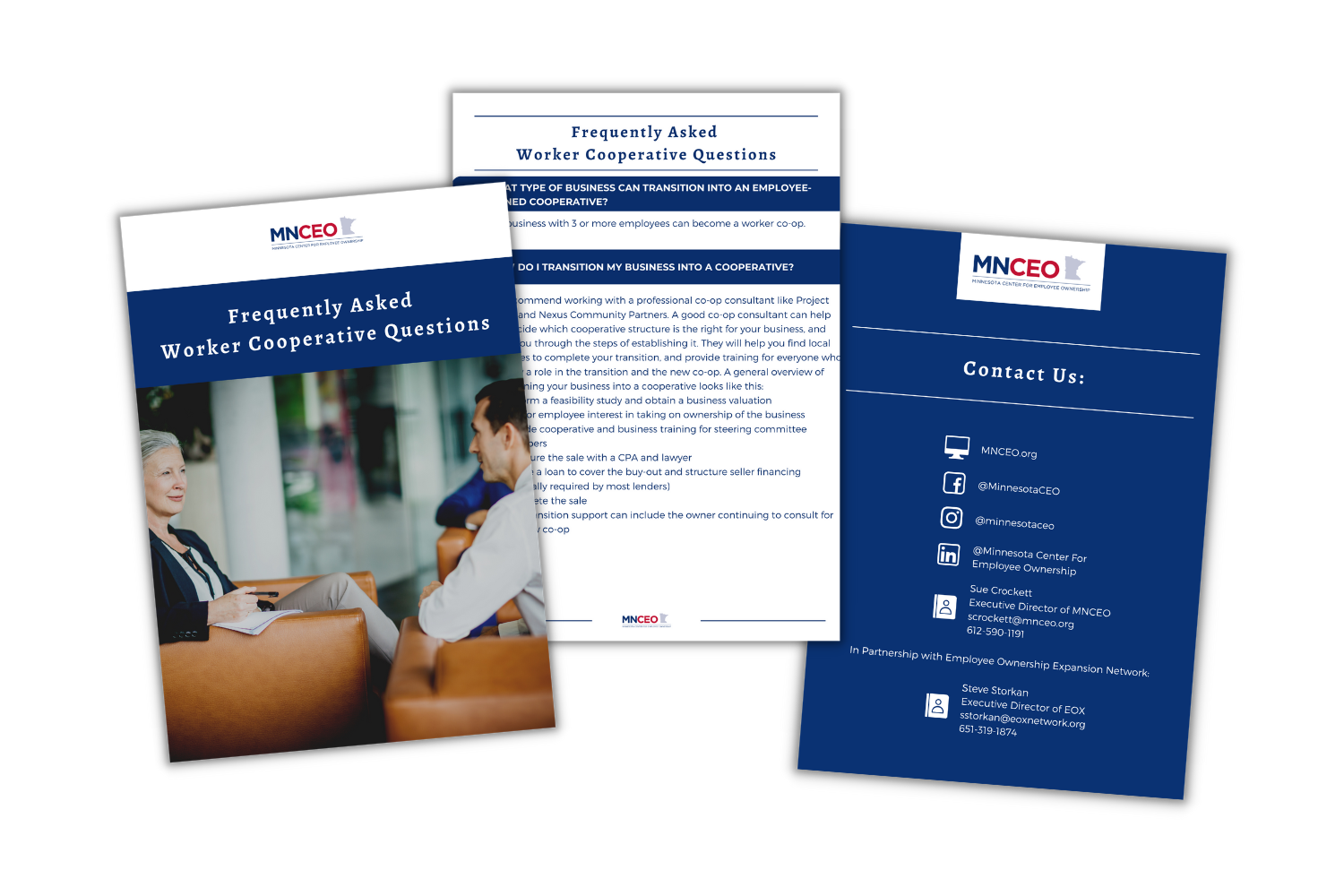
WORKER-OWNED COOPERATIVE
ESOPs are the most common kind of employee-owned company in the US. However, the most common form of employee ownership in the world is the Worker-Owned Cooperative. These are companies that are governed democratically, with employees voting for the board of directors. Each employee receives one and only one voting share. There are over 400 Worker-Owned Cooperatives in the US, but just a handful in Minnesota. However, worker co-ops can be a great option for smaller companies or those who want to prioritize workplace democracy.
Worker-Owned Cooperative Resources
A small-business owner is looking for an exit strategy and likes the idea of selling to their employees. But after investigating employee stock ownership plans, the owner decides that the upfront and annual costs of an employee stock ownership plan (ESOP) are too much.
The ERC has evolved since its inception, and the IRS has issued several rounds of guidance to help clarify the rules about how organizations can claim the credit. Here’s what your ESOP needs to know about qualifying for the ERC.
Looking for a quick bird’s eye view of Employee Ownership resources throughout Minnesota? Check out this article written by Minnesota Chamber of Commerce business owners looking for business succession support.
Featured in the Minnesota Society of CPA's September Footnote magazine, Sue Crockett explains the upcoming fate for many baby boomer owned businesses.
In an industry that focuses on profit and expect a 75%+ turnover rate, we support Long Haul Trucking and their endeavors to put their drivers first.
The Nexus Community Partners hosted a presentation titled, “Introduction to Succession Planning and Employee-owned Business Models” to debunk common misconceptions about Worker Cooperatives.
Employee ownership is also an empowering tool for business, offering employees value, purpose and wealth in exchange for their tenure. These offerings are motivating, leading to increases in productivity and boosting bottom lines.
Learn the answers to the most frequently asked questions about Worker Owned Cooperatives here!
View this table to see a basic outline of the various approaches to employee ownership. To make the table concise, there are some nuances and details left out. Follow the links to find more detailed explanations of various issues are provided where appropriate.
Learn the answers to the most frequently asked questions about Employee Ownership Stock Plans (ESOPs) here!
Hear the story of Happy Earth Cleaning Cooperative. Learn about how they did it, and why they choose to convert into a worker co-op. Nexus Community Partners was proud to partner with Project Equity in helping with the conversion process.
During this event, a panel of employee-owners and professionals shared their experiences of employee ownership in Minnesota as well as the logistics behind the operations of Employee Stock Ownership Plans (ESOPs) and Worker Cooperatives.
There has never been a better time to redefine “how business is done.” Local businesses keep wealth anchored in their communities, and independent ownership matters.
Environmentally-safe cleaning company Happy Earth Cleaning LLC has become the first Employee-Owned cleaning company in Minneapolis, after Founder Marion Dunbar realized she was in need of a succession plan that reflected their “people-first” culture.
The Coronavirus Aid-Relief and Economic Security Act (“CARES”) enacted on March 27, 2020 contained significant provisions related to charitable deductions, providing many individual and corporate donors with greater flexibility in making gifts to non-profit organizations.
As an entire generation of Baby Boomer business owners look towards retirement, a valuable new organization has launched; the Minnesota Center for Employee Ownership (MNCEO).
On March 9, 2020, a bill designed to stimulate the creation of employee-owned businesses and ultimately preserve jobs in Minnesota was introduced in the Minnesota Senate and referred to the Senate Taxes Committee.


EMPLOYEE OWNERSHIP IS WORTH INVESTIGATING
The next step is to get advice and learn how to start your journey to employee ownership.


















